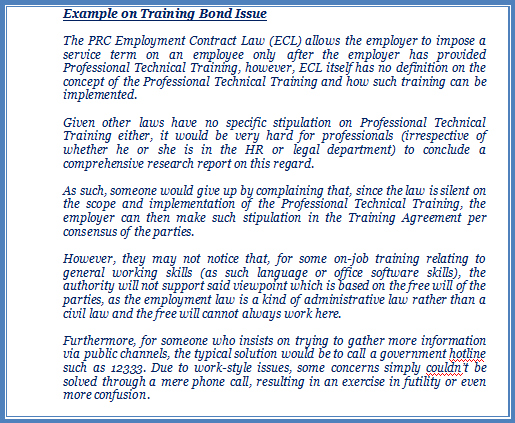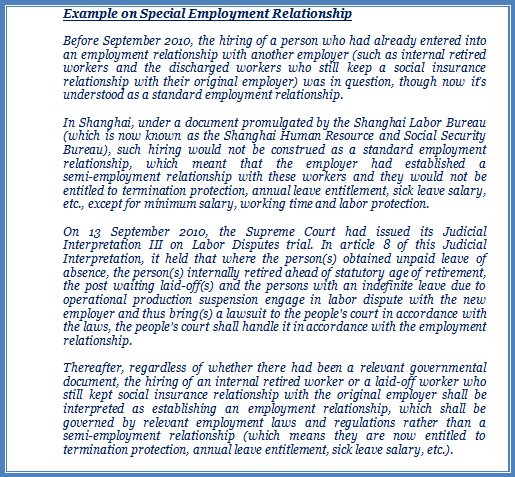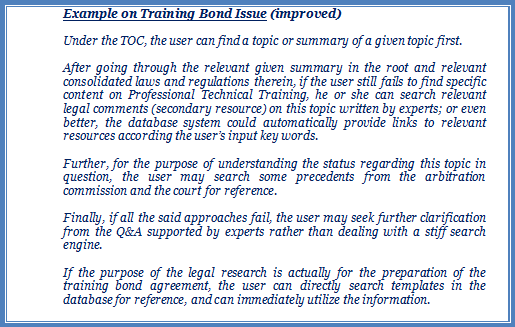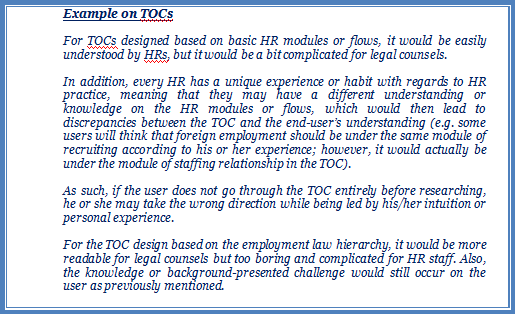1. Background
1.1 With the development of the PRC employment law in recent years, regardless the strict restrictions on unilateral termination, the vast information and requirements on employment promotion, contract terms and conditions, labor standards, social insurance and labor disputes resolution are all becoming more and more unmanageable due to the limitation of the knowledge and experience of individuals in a given HR or legal team.
1.2 Regarding said challenge, it is well known that there are lots of boutique firms stating they can help by providing the full-aspects of Human Resource Management Compliance (HRMC) service as external counsels, and as far as we know, they have helped on some projects and disputes. However, due to the following limitations, the solutions that they are depicting are not so ideal:
• for budget issues, very few companies can afford such costly service being implemented in day-to-day HRMC practice;
• for the position of external counsels, as many of them have no in-house experience, their understanding on business and risk preference may not match with clients’ style or needs;
• for the scarcity of senior staff in the employment law practice market, the service provided by the same firm may sharply vary from consultant to consultant.
1.3 Generally, as mentioned, for cost and efficiency, the employers should develop their own day-to-day HRMC toolkits when handling employment law issues.
2. Challenges from The Risk Identification
2.1 When handling day-to-day HRMC issues, the starting point is the identification of the potential risks, as you cannot manage what you aren’t aware of!
Legal research is a common methodology to discover or benchmark relevant potential risks when entering into an unfamiliar field of the employment law practice, which should be a basic skill for professionals who graduated from law school.
2.2 The fact is that, though the professionals are supposedly well taught in the skills dealing with legal research, very few professionals can perfectly complete the legal research on employment law because of its complicated hierarchy system and vague legislation skills.

2.3 As said example has indicated, the PRC employment law is silent on some crucial concepts thanks to its vague legislative ability. In practice, when disputes pertinent to a relevant concept occurs, competent authority (i.e. Labor Dispute Arbitration Commission or People’s Court) may take some principles like “stare decisis” under the common law judicial system to interpret relevant concepts (which is quite understandable as they want to honor the authority of the upper-level and be consistent with themselves). Further, if there is no precedent to follow, the arbitrator or the judge may finally solve the gap based on his or her discretion by weighing the equity and the protection of the employee.
2.4 Though the PRC employment law is silent on some legal concepts or, when detailing implementations on certain issues involving these concepts, the arbitrators or judges would have to solve relevant contentious points on their own discretion, following the blueprints of a civil law country, relevant Chinese authorities (i.e. Labor Dispute Arbitration Commission or People’s Court in different levels) would develop some of their own internal guidelines within their authorization based on trial experience to guide itself and its sub-institutions’ future application of employment law practices on relevant gap issues.
Only very few of such internal guidelines are accessible to the public, which are usually the judicial interpretations issued by the Supreme Court. Actually, such judicial interpretations are not included in the PRC Legislation Law, and it is hard to define the level of its legal effect. However, when reviewing a case, the arbitrator and the judge will probably apply relevant judicial interpretations first, although there may be some discrepancies between the judicial interpretations and the current laws and regulations.

2.5 If the professionals have no sufficient experience to uncover the potential risk, nor enough resources to conclude the legal research, the employer cannot benchmark the risk identification, and there would be no basis to implement the further HRMC activities.
3. The Rise of Law Database in HRMC
3.1 Said challenges can hardly be overcome by general in-house teams (or team members) without setting a position for senior employment counsel due to the complexity of the employment law and practice mechanism.
3.2 Recently, more and more law database service providers have found potential business opportunities in this niche area and are trying to provide quality service by designing specialized modules with the following features:
• Strong TOC drafted by experts specialized in both employment law and HR practice, which makes it more readable and user-friendly;
• Categorized and tailored result of legal research on certain topics, which would make it quite convenient to search for information;
• Selected template samples drafted by renowned experts or leading lawyers, which could be directly used;
• Lively Q&A column supported by experts, which is supposed to solve the problems that have not been incorporated in the database;
• Bilingual service, which is more convenient to quote for users from MNCs.
3.3 Thus, the HR or legal staff can make a more comprehensive legal research on assignments as their insights would not be limited to individual experience and they would have a pool of resources they could refer to.

• The user’s habit may vary from person to person, thus, no matter how elaborate a TOC has been designed, there are still a lot of users who find the database inconvenient for daily use;
• Some database providers pay more attention on the quantity of the content rather than its quality, as such, the user is overwhelmed by redundant information while crucial information is missed;
• Some key contents, such as internal guidelines, precedents and legal comments, are still not sufficient;
• Renowned experts or lawyers, those of whom are capable of providing quality content, remain scarce \* MERGEFORMAT ; they may also be easily distracted by other engagements, and may sometimes produce relatively unproductive content;
• Though the database itself is an assembly of collective wisdom of sorts, the vast knowledge therein cannot be transferred to or shared with the end users efficiently because of each individual’s technological limitations.
4. HRMC Solution Based on Law Database
4.1 When the database providers and their end-users see the business as mere “content vending”, the utilization of the law database as an HRMC toolkit would be nigh impossible.
The utilization of the content in the database is much more important than the content itself. With this in mind, a methodology that can efficiently match content to the needs of the users should be developed.
4.2 When implementing the legal research in the database, it would be advisable to follow the principles below:
• For time efficiency, never use key-word search as the first option.
For the layman, they usually have no clear idea on the legal terminology adopted in employment law legislation, and using the wrong or improper key-words would be time-consuming.
Moreover, a lot of legal concepts may have several synonyms (e.g. non-compete, trade restriction and competition restriction), and only after the user has searched all these words would he or she have a comprehensive understanding of the research topic.
Taking these into consideration, only after the failure of these methods should the user consider keyword searching.
• The user should try to familiarize himself or herself with the TOC first.
Though these TOCs from different database providers are designed by experts specialized in both employment law and HR practice, the logic in organizing such TOC would be totally different. Further, the readability of relevant TOC is not a guarantee that such TOC will be in line with the understanding of every user with a different knowledge base or background; instead, the readability would secures that the TOC could easily be understood and mastered by professionals or the layman in a comparably short time than those TOCs that are not well organized.

• If the preliminary legal basis cannot be found in TOC directly, the user may then consider searching the legal comments written by relevant experts or leading lawyers.
Generally, as per the cooperating relationship with database providers, a lot of experts or leading lawyers will provide their legal comments to the database on the latest employment issues, such as judicial explanation, typical cases and other popular topics in practice. In these comments, the legal ground and critical analysis will be quoted or formulated.
In addition, the user could also try to search precedents from different levels of Arbitration Commission or People’s Court to better understand the current practice. The legal ground and critical analysis will be easily found in these arbitration awards or court judgments.
• Finally, after exerting all efforts and the user still cannot obtain satisfactory answers, the user may seek assistance from the experts supporting the Q&A column.
Please note that, as these experts have no chance to review the user’s documents nor have they discussed with the user, the way the user expresses his or her question is quite important: if the user asks generically, a generic answer would be made, as these experts cannot provide specific replies without being aware of the details of each case; however, if the user asks specifically by stating a precondition, adding basic facts and concerns, a more practical answer can be produced.
The reason that I do not recommend seeking the advice from the experts at the very beginning is that the user may not be able to ask the right question or raise his or her concern correctly without doing preparation or preliminary research.
4.3 A very important function of the database is usually forgotten by lots of people (including the database providers themselves), which is the training or learning function of the database. To some extent, the entire database can be construed as an e-version loose-leaf reference book, along with its well designed TOC, the user can learn the employment law system comprehensively.
As such, the understanding of the user on employment law practice can be improved, thus, the capability of the user on handling HRMC matters will be enhanced, which in the end would be beneficial to the employer. Of course, it would be much better if such a learning process can be lead or assisted by an expert or a coach from the database provider with the form of a seminar or a workshop.
5. An Interim Conclusion
5.1 As the employment law practice is quite complicated and a lot of internal guidelines are revised on a frequent basis, even with the help of the Q&A in the database, without discussing the supposition of the user’s question, the information searched from the database can only function as a risk identification tool and a reference rather than a final legal opinion or solution.
5.2 Last but not least, as the database provider itself does not generate any content and all its contents are from external experts, it is strongly advisable for the database provider to focus on the advantage of its platform and recourses (users from renowned MNCs and experts from leading firms) surrounding such platform rather than the content itself. Once sufficient resources have been accumulated in the platform, there will be qualitative change and the users will obtain far more benefits than just pure content from such a platform.
Author’s Statement:
This legal essay is designed to provide general information about the utilization of the law database as an HRMC toolkit. It cannot be construed as being engaged in rendering professional service. If legal advice or other expert assistance is required, the service of a competent professional should be sought.
----------------------------------------
1.背景
随着中国劳动法近些年的发展,且不论有关法律法规在单方解除方面的严格限制,在就业促进、合同条款、劳动标准、社会保险及劳动争议等方面的海量信息及各种要求正变得越来越难以掌控,这(相当程度上)是由于用人单位内部人事或法律团队的个体经验限制所导致的。
针对上述挑战,很多“专业所”声称他们能够作为外部顾问提供全方位的人力资源管理合规服务,并且,如我们所知,他们也确实在某些项目及争议案件中发挥了重要作用,但囿于以下局限,他们所描绘的解决方案并非那么理想:
●由于预算原因,很少有用人单位可以承担高昂的费用而使得此类人力资源合规管理服务常态化;
●基于外部顾问的立场或视角,由于他们当中相当部分没有在企业内部从事相关工作的经验,这使得他们对于商业需求及风险控制之间平衡的把握不一定能够与客户的(文化)风格及需求相匹配;
●由于资深从业人员在劳动法律服务市场较为稀缺,同一律所所提供的服务极有可能会“因人而异”。
总之,如上所述,出于成本及效率考量,当处理劳动法律事务时,用人单位有必要考虑开发属于他们自己的基于法律数据库的人力资源合规管理工具。
......









